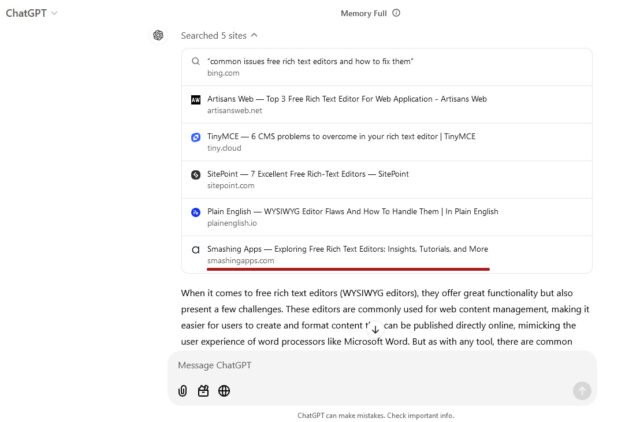Click here to buy secure, speedy, and reliable Web hosting, Cloud hosting, Agency hosting, VPS hosting, Website builder, Business email, Reach email marketing at 20% discount from our Gold Partner Hostinger You can also read 12 Top Reasons to Choose Hostinger’s Best Web Hosting
AI search engines, like SearchGPT, are changing how we look for information online. Instead of traditional search results, they offer conversational answers. This is great for users but requires a fresh approach to content creation. Here’s a clear 6 Steps to Rank Higher on SearchGPT and Other AI Search Engines.
Why Focus on AI Search Engines?
AI search engines prioritize user intent. They aim to understand what a user really wants. Unlike standard search engines, they give direct and precise responses instead of showing a list of links. This means:
- Clear and useful content gets highlighted.
- Conversations drive the results, not just keywords.
- Content must focus on solving user problems immediately.

Steps to Rank Higher on SearchGPT
1. Understand User Intent
Users often phrase their searches as questions, like:
- “How do I fix…”
- “What’s the best way to…”
Actionable Tip: Research popular queries in your niche using tools like AnswerThePublic. Create content that provides direct and complete answers.
Example: If you’re writing about “ransomware protection,” cover:
- What ransomware is.
- How it affects users.
- Step-by-step solutions.
Why It Works: Direct answers build trust and match AI’s conversational focus.
2. Use Conversational Language
Avoid technical jargon. Write as if you’re explaining to a friend.
Example: Instead of saying, “Implement comprehensive endpoint detection,” write, “Use tools that monitor all your devices for threats.”
Actionable Tip: Check if your sentences flow naturally by reading them out loud.
3. Structure Your Content
AI loves organized content. Make it easy to skim.
How To Do This:
- Use headers (H2, H3) to break up sections.
- Add bullet points for key takeaways.
- Use short paragraphs (2-3 sentences max).
Why It Works: Helps AI pick the right snippet to show users.
4. Include FAQs
People search for specific questions. Add an FAQ section to target these queries.
Example FAQs:
- How does SearchGPT rank content?
- Can AI search engines replace Google?
- How do I optimize for AI-generated answers?
Pro Tip: Use Google’s “People Also Ask” section for inspiration.
5. Focus on Trust and Authority
AI search engines prioritize credible content. They analyze:
- Your website’s domain authority.
- Accuracy of information.
- Citations from trusted sources.
Actionable Tip: Always link to verified sources. If you’re a small site, start by covering niche topics where competition is low.
We currently live in a world where businesses are paying hundreds of dollars to people for writing engaging articles and blogs, and thousands of dollars per month for social media marketing and SEO. Now using ChatGPT, anyone including you can do this really well – even if you have no experience in this! Most businesses are not aware of or are not using this right now – which is where you can come in and undercut existing providers while doing almost zero work – and this book will show you how to step-by-step – with instructions you can copy and paste. This market may become saturated a year from now – but this is the right time to start!
We wanted to rank for “Free Rich Text Editors” on ChatGPT. Here’s how it succeeded:
- Focused on Niche Topics The site avoided crowded keywords like “best text editors.” Instead, it targeted “Free Rich Text Editors.”
- Optimized for AI Search Articles used conversational language and included headings like:
- “What Features Make a Rich Text Editor Free and Useful?”
- “FAQs About Free Rich Text Editors.”
- Updated Regularly Each piece was reviewed every 3 months to add fresh trends and stats. This signaled AI that the content remained relevant.
Result: SmashingApps.com’s article became a go-to answer for queries about free rich text editors.
Strategies to Excel in AI-Driven Search Optimization
Ranking on AI-driven platforms like SearchGPT requires a strategic yet approachable content strategy. By focusing on AI search engine optimization tips and integrating user-focused writing, you can make your articles both engaging and algorithm-friendly. For instance, understanding conversational search techniques helps address user intent more effectively, making your content shine in results. Pair this with AI-friendly content ideas like answering niche queries or providing clear solutions, and you’re on your way to success. Adopting best practices for SearchGPT content, such as short paragraphs and optimizing for voice search, ensures relevance for the evolving search landscape.
Future Trends in AI Search
1. Voice Search Growth
More people are using voice assistants like Alexa and Siri. Ensure your content answers questions in a natural way.
2. Real-Time Updates
AI systems love fresh data. Regularly update your articles with the latest information.
3. Personalized Results
AI will provide even more tailored answers. This means niche-specific content will be key.
FAQs About Ranking on AI Search Engines
Q: How does AI decide which content to show? A: AI prioritizes relevance, clarity, and trustworthiness. Structured and updated content often ranks higher.
Q: Can AI searches replace traditional SEO? A: No, but they’re a complement. SEO fundamentals like keywords and backlinks still matter.
Q: Is optimizing for AI search engines expensive? A: Not at all. Focus on clear writing, niche topics, and regular updates to succeed without a big budget.
Final Thoughts
Ranking on SearchGPT and other AI search engines isn’t complicated. It’s about understanding user needs, creating clear content, and staying updated with trends. Follow these steps, and your content will be ready for the future of search.
Start small. Test what works. And remember, success is just a query away.
Now loading...








